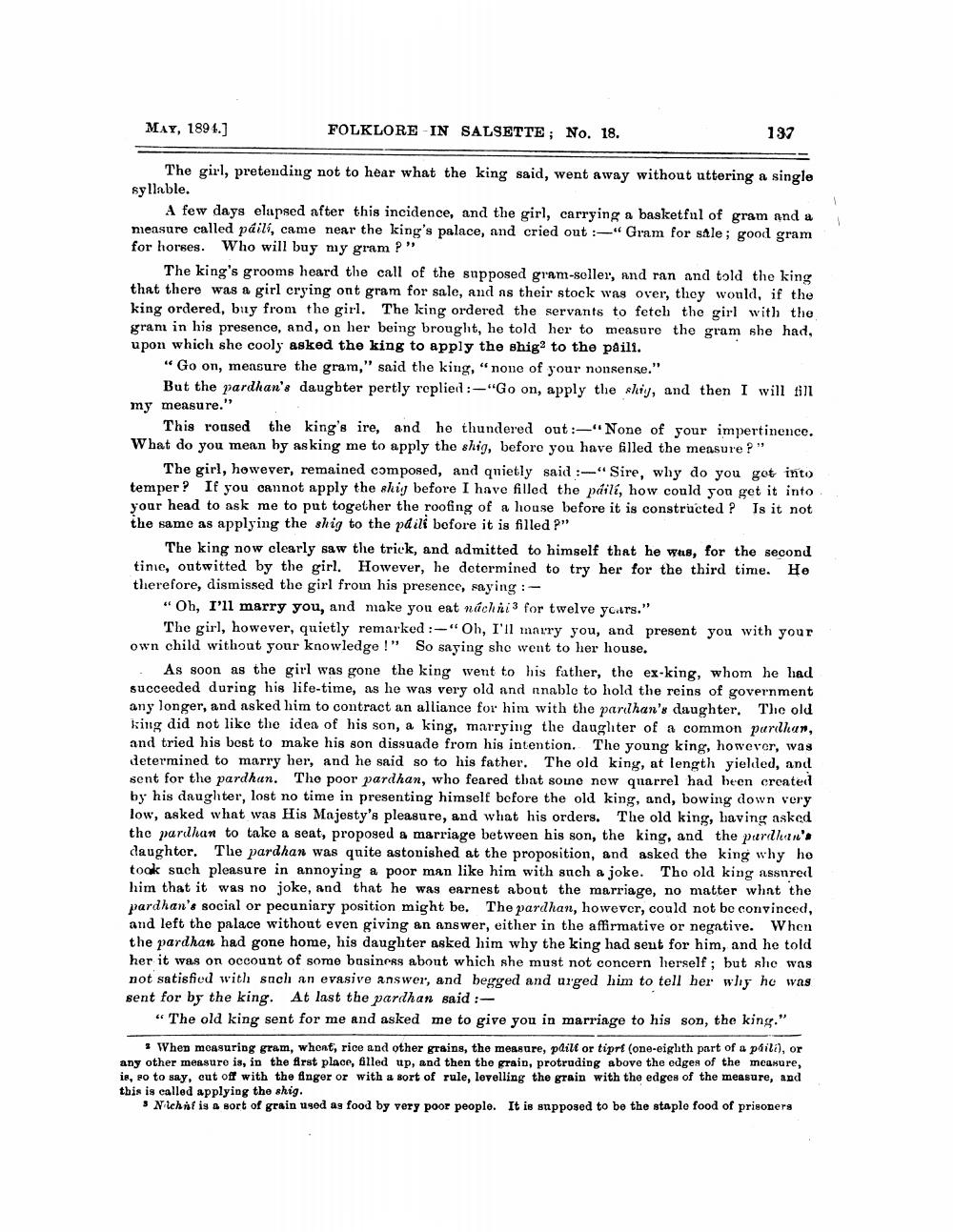________________
MAY, 1894.]
FOLKLORE IN SALSETTE; No. 18.
137
The girl, pretending not to hear what the king said, went away without uttering a single syllable.
A few days elapsed after this incidence, and the girl, carrying a basketful of gram and a measure called páili, came near the king's palace, and cried out :-"Gram for sale; good gram for horses. Who will buy my gram?"
The king's grooms heard the call of the supposed gram-seller, and ran and told the king that there was a girl crying ont gram for sale, and as their stock was over, they would, if the king ordered, buy from the girl. The king ordered the servants to fetch the girl with the gram in his presence, and, on her being brought, he told her to measure the gram she had, upon which she cooly asked the king to apply the shigo to the paili.
“Go on, mensure the gram," said the king, "none of your nonsense."
But the pardhan's daughter pertly replied :-"Go on, apply the skiy, and then I will till my measure."
This roused the king's ire, and he thundered out:-"None of your impertinence. What do you mean by asking me to apply the shig, before you have filled the measure ?"
The girl, however, remained composed, and qnietly said :-"Sire, why do you got into temper? If you cannot apply the shiy before I have filled the paili, how could yon get it into your head to ask me to put together the roofing of a house before it is constructed ? Is it not the same as applying the shig to the pd ill before it is filled P"
The king now clearly saw the trick, and admitted to himself that he wus, for the second tine, outwitted by the girl. However, he determined to try her for the third time. He therefore, dismissed the girl from his presence, saying: -
"Oh, I'll marry you, and make you eat náchnis for twelve yours."
The girl, however, quietly remarked :-"Oh, I'll maury you, and present you with your own child without your knowledge!" So saying she went to her house.
. As soon as the girl was gone the king went to his father, the ex-king, whom he had succeeded during his life-time, as he was very old and nnable to hold the reins of government any longer, and asked him to contract an alliance for him with the parihan's daughter. The old king did not like the idea of his son, a king, marrying the daughter of a common parillan, and tried his best to make his son dissuade from his intention. The young king, however, was determined to marry her, and he said so to his father. The old king, at length yielded, and sent for the pardhan. The poor pardhan, who feared that some new quarrel had been created by his daughter, lost no time in presenting himself before the old king, and, bowing down very low, asked what was His Majesty's pleasure, and what his orders. The old king, having asked the parilhan to take a seat, proposed a marriage between his son, the king, and the parillurn's daughter. The pardhan was quite astonished at the proposition, and asked the king why ho took such pleasure in annoying a poor man like him with such a joke. Tho old king assured him that it was no joke, and that he was earnest about the marriage, no matter what the pardhan's social or pecuniary position might be. The pardhan, however, could not be convinced, and left the palace without even giving an answer, either in the affirmative or negative. When the pardhan had gone home, his daughter asked him why the king had sent for him, and he told her it was on occount of some business about which she must not concern herself; but she was not satisfied with such an evasive answer, and begged and urged him to tell her why he was sent for by the king. At last the parihan said :
“The old king sent for me and asked me to give you in marriage to his son, the king."
• When measuring gram, whont, rice and other grains, the measure, pdill or tiprf (one-eighth part of a pili), or
tessure is, in the first place, Glled up, and then the grain, protruding above the edges of the measure. is, po to say, cut off with the finger or with a sort of rule, levelling the grain with the edges of the measure, and this is called applying the shig.
Nichif is a sort of grain used as food by very poor people. It is supposed to be the staple food of prisoners




